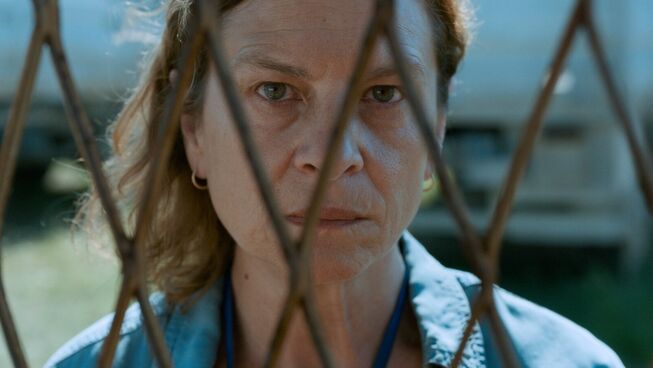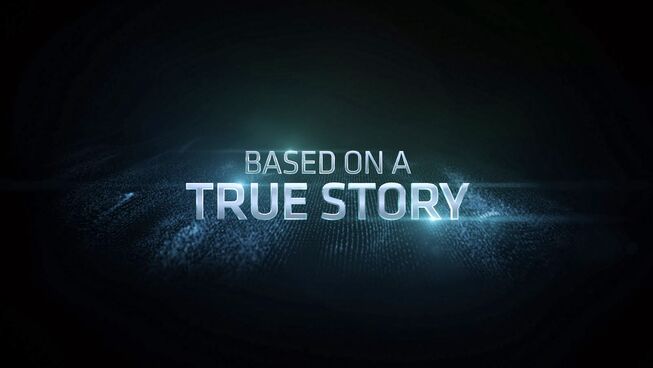
4 out of 5 stars
There are times when a story that comes along is so confronting that it is difficult to shake it from your conscience. It could be said that the point of the Bosnian film Quo Vadis, Aida? (translated: Where are you going, Aida?) is meant to make people remember the horrific accounts that it portrays. An Academy Award-nominated movie that provides a dramatic look behind the atrocities of the Srebrenica massacre in 1995.
Based on actual events during the war between Serbia and Bosnia involving the infamous General Ratko Mladić (Raymond Thiry). As things were coming to a conclusion during the conflict, the Bosnian town of Srebrenica was overrun by Serbian forces. Most of the residents tried to find sanctuary in the United Nations installation on the outskirts of town. Aida Selmanagić (Jasna Đuričić) was an interpreter who was working for the Dutch forces and oversaw the series of buildings. Yet, no one could have prepared her and the UN peacekeepers when over 25 thousand townspeople descended on the facility.
As the former teacher turned interpreter attempts to assist Colonel Thom Karremans (Johan Heldenbergh) and his undersupported battalion, Aida searches for her husband and two sons. Things eventually turned from desperate to chaotic and the building was not equipped for the population of a small city to live within its walls. This led to the Colonel negotiating with General Mladić and his forces to find the most humane method of caring for the Bosnian Muslims who inhabited the town. Even though Aida manages to find her family, nothing could prepare them for the unimaginable decisions that will face them and UN leadership. Especially as everyone inside is confronted with the evil that waits outside their doors.
With the aid of over twelve different production companies, director/writer Jasmila Žbanić was able to get this story told. One that few may be as aware of despite the very public war crimes trial of Ratko Mladić where he was convicted and imprisoned for atrocities against humanity. The young director paints a compelling portrait of this tragic situation to the point where one could almost smell the human excrement within the building and feel the townspeople's fear. Yet, few people outside of these nations would recall the genocide occurring in this modern era. This dramatisation was played out against the backdrop of actual events. Actions that irreversibly changed the history of these two nations and the world.
By adding in the personal story of Aida and her family, this production manages to put a grief-stricken face on this nation. Jasna Đuričić was brilliant as she did all she could to help the people of her community and those of her own household to survive this horrendous situation. Then to unveil the desperation of the UN soldiers confronted by the vicious tactics of the Serbian oppressors made for compelling performances that seep into your soul and fester from the pain they portray. The anguish was exacerbated by the frenetic pace of these events and the hopeless nature of every person involved.
Quo Vadis, Aida? became more of an education than entertainment in the end. One that will leave lasting impressions on the soul and cause many to pray that nothing like this occurs again in our lifetime.
Reel Dialogue: Where are you going?
The film's title has an illusion to various accounts inside and outside of the Bible. Translated as ‘where are you going,’ this question does exist within a discussion Jesus was having with his disciples.
In the account written by John, we can read Jesus saying, ‘And if I go and prepare a place for you, I will come again and will take you to myself, that where I am you may be also. And you know the way to where I am going.' Thomas was one of his more inquisitive followers and he asked, ‘Lord, we do not know where you are going. How can we know the way?’ Or simply put, ‘where are you going, Jesus?’
This leads to one of the most famous and potentially misunderstood quotes from Jesus, “I am the way, and the truth, and the life. No one comes to the Father except through me. If you had known me, you would have known my Father also. From now on you do know him and have seen him.”
His answer provides us with a solution and a question. Jesus says that he is going to God, the Father, and the only way to join him is to follow him. Simple, yet profound. The only way to God is to follow Jesus. He knows where he is going, which leads us to consider the answer for ourselves.
Quo Vadis or where are you going?









